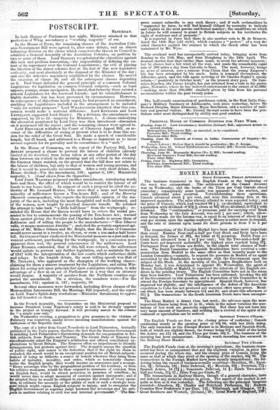POSTSCRIPT.
SATURDAY.
In both Houses of Parliament last night, Ministers attained to that perfection of Whig ascendancy a "working majority" of one. In the House of Peers, the remaining clauses of the Australian Colo- nies Government Bill were agreed to, after some debate, and an almost balancing division on the clause which empowers the Queen in Council to establish a General Assembly of the Australian Colonies, on petition by two or more of them. Lord STANLEY recapitulated the objections against this rash and perilous innovation,—the impossibility of defining the ex- tent of its supremacy over the Colonial Legislatures ; the evil of plseing the liberties of the minor colonies first at the feet of this new legislative authority, and next absolutely at the disposal of the Minister of the day; and also the defective machinery established by the clauses. He moved the omission of clause 30, and all the subsequent clauses depending on it.. Earl Garry defended the general principle of a common Colonial Legislature for legislation on common Colonial subjects,—such as legal appeals, postage, steam navigation. He stated, that formerly there existed a general Legislature for the Leeward Islands ; and its reestablishment is highly desirable, but has been prevented by circumstances. However, in consequence of objections lately urged, he had prepared an amendment, enabling the Legislatures included in the arrangement to be included "only for certain purposes." Lord WHARNCIIFFE admitted that this con- cession would make a material difference. Lord ICD4NAIRD and Lord Licrinurois supported Lord Stanley. On a division, the amendment was negatived, by 23 to 22—majority for Ministers, 1. A clause embodying the alteration mentioned by Lord Grey was then introduced—discussion on it postponed till the report ; and the remaining clauses were agreed to. Lord Birotuntem withdrew his Court of Chancery Appeal Bill, on ac- count of the difficulties of seeing at present what is to be done this ses- sion for the relief of the Great Seal. He made a speech of considerable length, but ill heard, and addressed to a House so impatient as to incur several reproofs for its garrulity and its resemblance to a "mob."
In the House of Commons, on the report of the Factory Bill, Lord Ammar proposed a clause to prevent the labour of children (already limited in its duration) from being taken at any other period of. the day than between six o'clock in the morning and six o'clock in the evening. Sir Gamma GREY resisted, on the ground that the bill does not relate to the labour of children, but only to that of women and young persons, and that it would be practically inconvenient. After a very short debate, the House divided—For the amendment, 159; against it, 160; Ministerial majority, 1. (Loud cheers front the Opposition.) Lord Tour/ MANNERS proposed another amendment, introducing words here and there, the effect of which would be to restrict the labour of all hands to ten hours daily. In support of such a proposal he cited the au- thority of Mr. Leonard Homer, who avers that a large and increasing minority of millowners favour a Ten-hours Bill ; and of the Morning Chronicle correspondent, who reports the favourable opinion of the ma- jority of the men, including the most thoughtful and well-informed, and of the women, now taught by practical domestic benefit He rebuked the attempt to take back "a little half-hour" from the workpeople • re- minded the House that the Queen would have to return the medal pre- sented to her to commemorate the passing of the Ten-hours Act ; warned them against giving the Socialist and Chartist a handle to accuse them of fickleness and of selling the people to the manufacturer—" Hoc Ithaeus velit, et magno mereentur Atreidre " ; and cited the privately expressed opi- nions of Mr. Milner Gibson and Mr. Bright, that the House of Commons would never assent to a twelve an eleven, or even a ten-and-a-half hours bill. Sir °Bowe GREY vindicaied the Ministerial measure as a just and con- venient settlement, purchasing for the workpeople, by a concession more apparent than real, the general concurrence of the millowners. Lord Toms RUSSELL contended, that if this bill were refused, the millowners would agitate to prevent any further legislation and so maintain the act of 1847 with the interpretation of the law courts which authorizes shifts and relays. In the longish debate, the most telling speech was that of Mr. D/SRAELI, -who appeared as the champion of the working classes ; claiming for them a sincere treatment bythe Legislature, and rating Min- isters for acting not upon principle but upon a nisiprius exception, to take advantage of a flaw in an act of Parliament in a way that an attorney would despise. A majority of speakers from the Northern counties sup- ported the amendment. On a division, the numbers were—For the amendment, 142; against it, 187; majority, 39.
Several other measures were forwarded, including divers clauses of the Metropolitan Interments Bill, the Marriage Bill (reported), and the report on Lord Ness's Spirit-duty resolutions—Ministers threatening to oppose the bill founded on them.


























 Previous page
Previous page